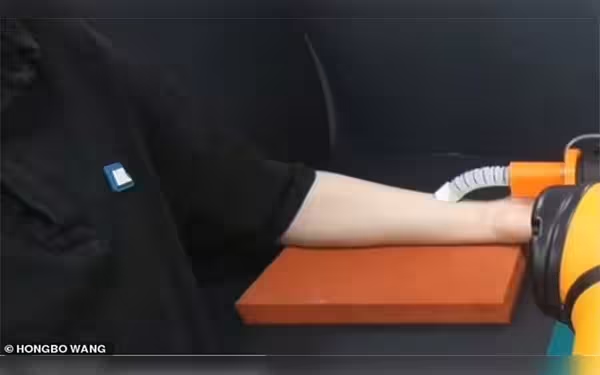Saturday, November 16, 2024 05:26 PM
Revolutionary Robotic Finger Enhances Early Cancer Diagnosis
- Ultra-sensitive robotic finger detects cancerous lumps.
- Non-invasive alternative for early cancer detection.
- Potential to transform healthcare diagnostics.
 Image Credits: dunyanews.tv
Image Credits: dunyanews.tvAn ultra-sensitive robotic finger could revolutionize early cancer diagnosis, offering a non-invasive alternative for better patient outcomes.
In recent years, the field of robotics has made remarkable strides, particularly in the development of devices that can mimic human senses. One of the most exciting advancements is the creation of an ultra-sensitive robotic "finger" that has the potential to revolutionize early cancer diagnosis. This innovative device is designed to detect subtle changes in the human body, which could lead to earlier detection of cancerous lumps and other abnormalities.
The robotic finger is equipped with a sophisticated sense of touch, allowing it to take patient pulses and check for unusual lumps with remarkable precision. At the heart of this technology is a coil wound around each air chamber of the device's bending actuators. These actuators are the components that enable the finger to move and respond to different pressures. Additionally, a twisted liquid metal fiber is mounted at the fingertip, enhancing the finger's sensitivity and ability to detect minute changes.
Early detection of cancer is crucial, as it significantly increases the chances of successful treatment. Traditional methods of diagnosis often rely on imaging techniques or invasive procedures, which can be uncomfortable for patients. The introduction of this robotic finger could provide a non-invasive alternative, making it easier for healthcare professionals to identify potential health issues during routine check-ups.
Moreover, the implications of this technology extend beyond just cancer diagnosis. The ability to accurately assess various medical conditions through touch could lead to advancements in how we approach healthcare. Imagine a future where patients can receive immediate feedback on their health status without the need for complex machinery or lengthy procedures.
As we look ahead, it is essential to consider the ethical implications and accessibility of such technology. While the robotic finger holds great promise, ensuring that it is available to all patients, regardless of their background, will be vital. The healthcare community must work together to integrate this technology into existing systems, making it a standard part of medical examinations.
The development of the ultra-sensitive robotic finger represents a significant leap forward in medical technology. By enhancing our ability to detect cancer and other health issues early, we can improve patient outcomes and potentially save lives. As this technology continues to evolve, it is crucial for society to embrace these advancements while ensuring they are accessible to everyone.













